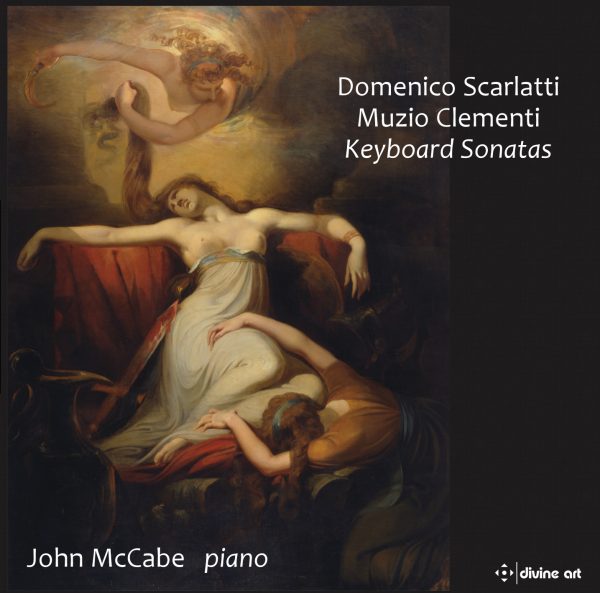Fanfare
This is a reissue of two separate Hyperion discs, originally issued in 1981. But more than that, it is a memorial, and a love letter, to the pianist, John McCabe (1939-2015), from his widow, Monica McCabe. Regardless of your reaction to the music therein, the sense of mourning, of pride in her husband’s accomplishments, and her deep love that pervade her accompanying note are bound to be on your mind as you listen. I’m sure she didn’t sit down and write it with that goal in mind, but certainly it is there, and it lifts this recording out of the stack on new releases with which we are all inundated and into the realm of something special.
The music is a mix of the familiar and the (mostly) unknown. McCabe apparently spent a lot of time mentoring younger composers and playing their works, but everybody knows and loves Scarlatti’s sonatas. Not only did he write a plethora of them (somehow, never giving the listener the feeling that he is repeating himself), but many of them are playable by almost every piano student. I know they gave me a great feeling of accomplishment, even though it was clear that if I ever made my living with a piano it would involve moving it in a truck. Mrs. McCabe waxes rhapsodic about her husband’s way with Scarlatti, and many will agree. My problem here, however, is that my love for the sonatas is based on the firm belief that if they are not played on the harpsichord, too much of their essence is lost. The performances here are in fact excellent; but to me, Scarlatti on the piano is like a performance of Hamlet in which all of the actors are dressed in zoot suits.
Now, all those pianists I referred to above who know and love Scarlatti also know Muzio Clementi—all too well. I was introduced to him when I was about 10, and he shortly became the bane of my existence. And if you are, like me, an ex-piano student from the later Jurassic period, you know what I’m talking about. It was that damn sonatina (in C, op. 36/1)!! The only piece I ever saw with Clementi’s name on it. Through the fog of the decades, I can still hear it: DAH dee dee dump dump, DAH de dee dump dump, dee dee dee dee dee dee dee dee dee dee dee dee DAH dee dee dump dump, etc. I don’t remember exactly how it came to me, but at the time, it seemed as if the entire universe of music for children’s piano study was split by a person named John Thompson, who was famous for being a person named John Thompson, and a person named John W. Schaum, who was famous for not being John Thompson. Each of them had an endless series of piano books that got harder and more complex until the student was ready to make his debut at Carnegie Hall (presumably at the exact time when all the other kids were out in the empty lot playing baseball). Perhaps the sonatina was in one of those. (I checked the net and found that both series were still available, still looking just as they did when they were inflicted on me, leading me to wonder if “John Thompson” and “John W. Schaum” might turn out to be corporate avatars, like Uncle Ben or Betty Crocker.)
But time marched on, as it often does, and as the recording industry took off. We started to hear other music by Clementi—orchestral music. Symphonies. Good ones! So it turns out that after coming home in the evening from his regular job (tormenting children), he indulged in his hobby (writing excellent Beethoven-ish symphonic music). But his route to the Pantheon of Great Composers was blocked, perhaps by that sonatina. My lovingly remembered harmony professor at UCLA, Robert Trotter, referred to all late 18th-century composers who were not Mozart or Haydn as “Carl Cristophe Cannabich”, and this is where poor Clementi ended up.
But recordings like this one may have a hand in changing that. McCabe, showing a great affinity for Clementi’s piano sonatas, uncovers astonishing new realms of beauty, music that leaves Herr Cannabich in the dust. Imagine the composer who could write these would spend time writing The Sonatina From Hell (well, probably money was involved). But the Clementi who wrote sonatas, concertos, and symphonies deserves a seat at the grown-up’s table. John McCabe might well be remembered as the man who started him on the path.
@divineartrecordingsgroup
A First Inversion Company
Registered Office:
176-178 Pontefract Road, Cudworth, Barnsley S72 8BE
+44 1226 596703
Fort Worth, TX 76110
+1.682.233.4978












